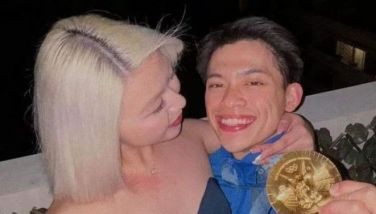Do gay movies always end up tragic?

Film review: The Third Party
MANILA, Philippines – When traditional movies deal with serious, offbeat relationships especially same sex, one of the gay characters dies or is usually killed in the end, or they part, in any case sending the lovers to perdition for their forbidden love. Rare are gay movies with happy or fun endings, with James Ivory’s elegant-as-usual period piece, E.M. Forster’s novel Maurice (1987) with the young Hugh Grant, and Ang Lee’s pre-Brokeback Mountain comedy The Wedding Banquet (1993), among them.
If two guys — or gals — steal happy, loving moments together, old traditional moviemakers want them punished with a tragic ending.
In Star Cinema’s current The Third Party, scriptwriters Charlene Sawit-Esguerra and Patrick Valencia — from the story by Enrico Santos — are careful about political correctness and not lapsing into old local stereotypes, concerned primarily with the brand moviegoers have come to expect from the studio which has thrived on dramas and rom-coms with tested ingredients. This is the antithesis to the style which has made indie film director Jason Paul Laxamana one of our more honored indie directors but he is astute enough to follow the rules of the studio system. Among the givens are a star cast or love team, high production values with bright and colorful visuals, a familiar tune to hum long after the movie has ended, and a pleasant plot with just the right zing to keep the moviegoers’ interest glued.
Having paired heartthrobs John Lloyd Cruz and Luis Manzano before as star-crossed lovers in a movie that drew the crowds (with the ever-popular Vilma Santos also leading the cast), the studio is aware that out-of-the-box love triangles need not be box-office poison. To be sure, the plot hews to established formula. Act 1: Girl loses boy. Boy comes back with another boy. Act 2: A variation on the mènage a trois, a set-up in which the girl is made to accept a convenient proposal for an unusual arrangement with the couple. Act 3: Reality bites.
In any movie straight or gay, it is always welcome to see characters who are intelligent and sensible. Many other stories are often a letdown because the drama moves forward when a character or characters commit one dumb mistake after another, or are nasty. How refreshing that the leads in The Third Party are decent, caring and mature individuals, and they are well-acted by the actors, from the leads to the minor players (Cherry Pie Picache, Alma Moreno looking like a young actor named Vandolph).
Leading the cast, Angel Locsin plays Andi Medina, an events organizer who has just been dumped by her boyfriend (Paolo Paraiso) and is in that interesting stage. Andi is the slightly kooky live wire who carries much of the weight of the film. Her situation — as a beleaguered, pregnant woman — recalls those in Blake Edwards’ Micki and Maude (1984) with Dudley Moore and Amy Irving, and the recent Bridget Jones’ Baby with Rene Zellwegger. You know things won’t be swimmingly easy but are sure that things will end up well. Or will it?
Sam Milby’s Max and Zanjoe Marudo’s Christian are what might be called eligible bachelors, prized partners some women would want to hook. They are both dashing and dapper, successful, high-earning medical doctors. Though much shorter than his man (in the old days, they would be called Mutt and Jeff), Max is a heartthrob, sweet but wishy-washy.
As a cosmetic surgeon, he is indifferent to his lady patient’s flirtations. Yet his manhood is succumbing once more to Andi’s womanly charm. At this stage of his life, Max is still grappling with his sexuality, giving weight to the idea that bisexuality is a mere escape latch for the confused. Otherwise, he is an ideal he-man, his straight acting cultivated through years of putting up a front to his gay-hating father (Al Tantay). When the dad berates Max’s sister (Matet de Leon) for not telling him she has known her brother’s true gender all along, she says, “Isusumbong ko siya? Ano ako, pusher?”
Zanjoe’s Christian, a take-charge — you might even say, domineering — guy, is surer of himself. He is manly, except when he lets down his hair at the karaoke or when he says unself-consciously “charot” or “ililigtas ni Darna.”
More than two decades ago, two men hugging or kissing each other amorously on the big screen drew hisses and howls among the moviegoers, as in The Wedding Banquet. Local actors would likely dread the idea of being jeered like that but maybe local audiences are more mature now, thanks to the daring act by showbiz Princes Charming like John Lloyd and Dennis Trillo (TV’s My Husband’s Lover) who have shown what gay militants may call the new normal without eliciting catcalls and homophobia.
With the new awareness, thanks to directors and scriptwriters who delve into the humanity of their characters. The gay figures are not made fun of, not ridiculed; they are portrayed as dignified and human. If viewers laugh, it is because the situation or some personal whimsy is funny, not the gay people.
Now, as to whether the ending of The Third Party is a cop-out, whether Max will repudiate his homosexuality and go back to Andi, leaving Christian devastated, spoilers are a-no-no, sorry.
- Latest
- Trending


































